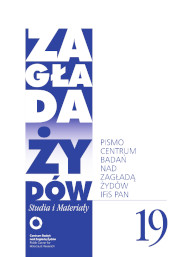Ogłoszenie
ONLINE FIRST, the 19th volume of the yearbook "Holocaust Studies and Materials"
 The volume being handed over to readers consists of two thematic blocks: The 80th anniversary of the Warsaw Ghetto Uprising and post-war search for justice. The anniversary publications begin with an extremely important text by Israeli researcher Havi Dreifuss on the creation and functioning of the Jewish Combat Organization command. Among other things, it brings an analysis of one of the most important documents of the time, a letter from Mordechai Anielewicz to Yitzhak Cukierman, the representative of the ŻOB on the Aryan side, quoted in versions that differ significantly from each other. The subject of the next study, by Sharon Geva, is the role of women in the Jewish underground. It is supplemented by accounts written during the occupation by Poale Zion Left leaders Pola Elster and Hersh Berlinski, a member of the ZOB command. Elster's notes show the first days of the uprising, while Berlinski's texts, about the establishment of the ŻOB and later episodes, are published in a revised version and supplemented by excerpts abandoned in the first edition concerning, among other things, the perception of the Polish underground. The next two articles address the issue of the memory of the uprising in Poland. Jacek Leociak analyzes commemorations in three periods: the earliest ones, from 1944-1945, from the critical year of 1968 and contemporary ones.
The volume being handed over to readers consists of two thematic blocks: The 80th anniversary of the Warsaw Ghetto Uprising and post-war search for justice. The anniversary publications begin with an extremely important text by Israeli researcher Havi Dreifuss on the creation and functioning of the Jewish Combat Organization command. Among other things, it brings an analysis of one of the most important documents of the time, a letter from Mordechai Anielewicz to Yitzhak Cukierman, the representative of the ŻOB on the Aryan side, quoted in versions that differ significantly from each other. The subject of the next study, by Sharon Geva, is the role of women in the Jewish underground. It is supplemented by accounts written during the occupation by Poale Zion Left leaders Pola Elster and Hersh Berlinski, a member of the ZOB command. Elster's notes show the first days of the uprising, while Berlinski's texts, about the establishment of the ŻOB and later episodes, are published in a revised version and supplemented by excerpts abandoned in the first edition concerning, among other things, the perception of the Polish underground. The next two articles address the issue of the memory of the uprising in Poland. Jacek Leociak analyzes commemorations in three periods: the earliest ones, from 1944-1945, from the critical year of 1968 and contemporary ones.
An interesting addition is Joanna Bachura-Wojtasik's discussion of the content of Polish Radio broadcasts in the anniversary context. An integral part of the uprising block is a profile of Jewish National Committee leader Adolf Berman outlined by his son Emanuel, supplemented by three texts devoted to the fate of his archive. The "Materials" section publishes documents compiled by Maria Ferenc on the plans to rescue Jewish organization activists, an unpublished account by a man named Maur about hiding in a bunker in the first days of the post-war period written down on the Aryan side (edited by Barbara Engelking), and the diary of ten-year-old Rutka Goldman deported to Majdanek (provided by Marta Grudzińska). The "Holocaust Commemoration" section includes, among others, an article by prominent violinist Maria Slawek on music performed in the context of the anniversary.The volume has two thematic blocks: the 80th anniversary of the Warsaw Ghetto Uprising and post-war “account settling” between Poles and Jews . This anniversary publication opens with an extremely important text by the Israeli researcher Havi Dreifuss on the establishment and functioning of the Jewish Fighting Organization command. Among other things, it brings an analysis of one of the most important documents of the time, a letter from Mordechai Anielewicz to Yitzhak Cukierman, the the JFO representative on the Aryan side, quoted in versions that differ significantly from each other. The second study by Sharon Geva deals with the role of women in the Jewish underground. It is supplemented by accounts written during the occupation by leaders of Poale ZionLeft Pola Elster and Hersh Berlinski, a member of the ZOB command. Elster's notes portray the early days of the uprising, while Berlinski's texts, concerning the establishment of the JFO and the subsequent events, are published in a revised version and supplemented by excerpts not published in the first edition that deal, among other things, with the perception of the Polish underground. The next two articles address the issue of the memory of the uprising in Poland. Jacek Leociak analyzes commemorations in three periods: the earliest ones, from 1944–1945, from the critical year 1968 as well as contemporary ones.
An interesting addition is Joanna Bachura-Wojtasik's discussion of the content of Polish Radio broadcasts in the uprising anniversary context. An integral part of the uprising block is a profile of Adolf Berman, one of the leaders of the Jewish National Committee by his son Emanuel, supplemented by three texts devoted to the fate of his archive. The "Materials" section publishes documents compiled by Maria Ferenc on the plans to rescue activists of Jewish organizations, an unpublished account by a man known as Maur about hiding in a bunker in the early days of the post-war period written down on the Aryan side (edited by Barbara Engelking), and the diary of ten-year-old Rutka Goldman deported to Majdanek (provided by Marta Grudzińska). The "Holocaust Commemoration" section includes, among others, an article by the prominent violinist Maria Sławek on music performed in the context of the anniversary.
 English
English
 Język Polski
Język Polski


